True Crabs of French Frigate Shoals
Phylum: Arthropoda. Subphylum: Crustacea. Class: Malacostraca. Order: Decopoda. Infraorder: Brachyura
Crabs are among the most easily recognized of all marine invertebrates. Nearly everyone has an idea of what a crab looks like. But actually, crabs come in a staggering variety of sizes, shapes and colors, making it hard at times to define what a crab really is. Like lobsters, shrimps, hermit crabs, and other crustaceans with five pairs of legs, crabs are "decapods" (a name that means "ten legs"). The "true" crabs belong to a group of decapods called the Brachyura (meaning short-tailed), in recognition of the fact that their tail (abdomen) is reduced in size and is tucked under the body; the abdomen of a crab can only be seen from below (or by holding the crab upside down). The abdomen is wide in female crabs, in order for them to carry the egg mass after eggs have been produced, and it is narrow and straighter in male crabs. All crabs have the first pair of legs modified into pinching claws, and usually these modified legs are heavier or longer than the remaining legs. This leaves four pairs of legs for walking or swimming. But several groups of crabs, including some that are found in the waters off French Frigate Shoals, also have claws on the back legs. These legs are specialized for holding pieces of sponges, sea fans, or other coverings over the crabs as camouflage. Some crabs even have three pairs of legs with claws on them. Most crabs are opportunistic feeders, which really means that they will eat just about anything they come across. But some are very specialized. For example, some of the species at French Frigate Shoals live only on live corals and are adapted to eating the mucous these corals produce; other species are found only on sea cucumbers; some species are adapted to opening snail shells; some eat algae; and on it goes. It is estimated that there are 5,000 different kinds (species) of crabs in the world, which is about a third of all known decapods. Only about 200 different species of crabs have been reported from Hawaiian waters, but we are adding to that number every day.
By Joel Martin.
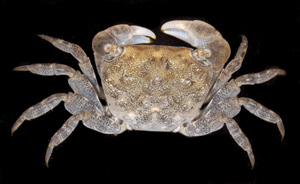

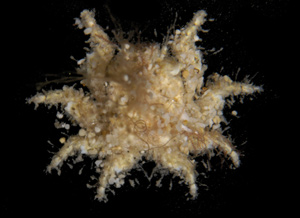
Family: Sesarmidae
Collected at:
Collection method:
Photo: Gustav Paulay
Family: Grapsidae
Collected at:
Collection method:
Photo: Gustav Paulay
Family: Mithracidae
Collected at:
Collection method:
Photo: Gustav Paulay


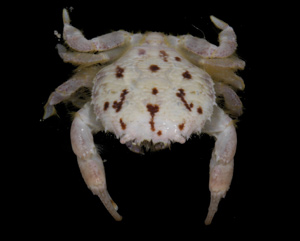
GDynomene
Family: Dynomenidae
Collected at:
Collection method:
Photo: Gustav Paulay
Family: Xanthidae
Collected at:
Collection method:
Photo: Gustav Paulay
Family: Atelecyclidae
Collected at:
Collection method:
Photo: Gustav Paulay
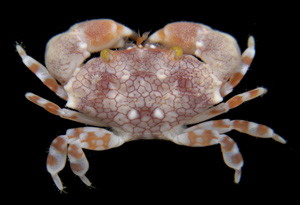

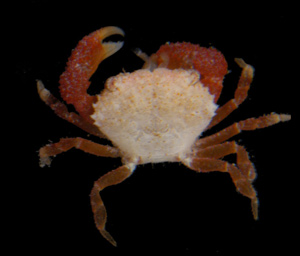
G?
Family: Xanthidae
Collected at:
Collection method:
Photo: Gustav Paulay
Family: Xanthidae?
Collected at:
Collection method:
Photo: Gustav Paulay
Family: Xanthidae
Collected at:
Collection method:
Photo: Gustav Paulay
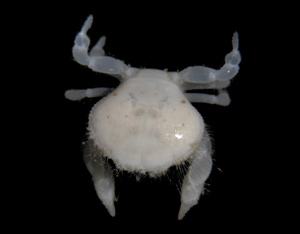


GPalapedia
Family: Atelecyclidae
Collected at:
Collection method:
Photo: Gustav Paulay
Family: Epialtidae
Collected at:
Collection method:
Photo: Gustav Paulay
Family: Leucosiidae
Collected at:
Collection method:
Photo: Gustav Paulay



G?
Family: Xanthidae
Collected at:
Collection method:
Photo: Gustav Paulay
Family: Xanthidae
Common name: Hawaiian Pom-Pom Crab
Collected at:
Collection method:
Photo: Joel Martin
Family: Xanthidae
Collected at:
Collection method:
Photo: Gustav Paulay


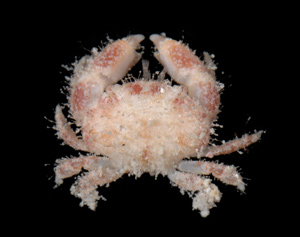
GPolydectus cupulifer
Family: Xanthidae
Common name: Teddy-bear Crab
Collected at:
Collection method:
Photo: Gustav Paulay
Family: Xanthidae
Collected at:
Collection method:
Photo: Gustav Paulay
Family: Xanthidae
Collected at:
Collection method:
Photo: Gustav Paulay



GDynomene
Family: Dynomenidae
Collected at:
Collection method:
Photo: Gustav Paulay
Family: Portunidae
Collected at:
Collection method:
Photo: Gustav Paulay
Family: Xanthidae
Collected at:
Collection method:
Photo: Gustav Paulay
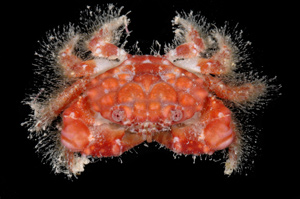
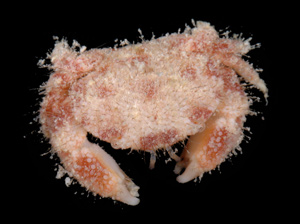
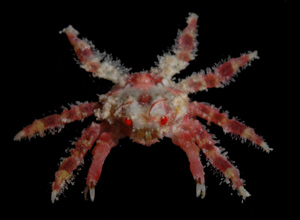
Tweedieia laysani?
Family: Xanthidae
Collected at:
Collection method:
Photo: Gustav Paulay
Family: Xanthidae
Collected at:
Collection method:
Photo: Gustav Paulay
Family: Epialtidae
Collected at:
Collection method:
Photo: Gustav Paulay